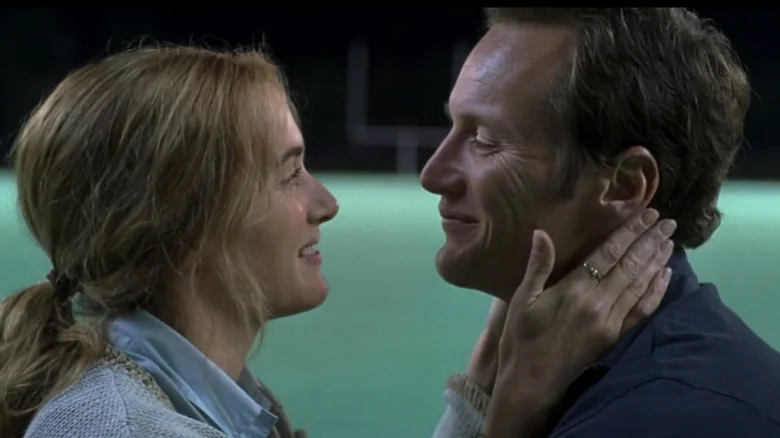Within the scope of modern cinema, Todd Field has become well-known for his nuanced examination of complex characters, as seen in his acclaimed film Tár, which focuses on the world of a renowned conductor. However, before Tár and its powerhouse performance by Cate Blanchett gained him widespread recognition, Field had already collaborated with another renowned actress, Kate Winslet, on a different thought-provoking film—Little Children. This film, like Tár, delves into the intricacies of human behavior and relationships, focusing on the flaws and contradictions of its characters. The movie’s ending is one that has left audiences contemplating its depth, as it presents a conclusion that is both satisfying and open to interpretation.
Little Children Ending Explained
Todd Field’s journey with Little Children began during his attempt to adapt Revolutionary Road, a project that ultimately fell apart due to creative differences. Undeterred, Field turned his attention to adapting Tom Perrotta’s novel Little Children into a film. Perrotta, the author of the book, worked closely with Field on the screenplay, ensuring that the adaptation remained true to the novel’s complex emotional View. The result was a multi-layered film that received critical acclaim, including three Academy Award nominations. Its most compelling aspect is its portrayal of deeply flawed characters, with a conclusion that has stuck with audiences long after the credits roll. Roger Ebert described the film’s ending as a “sucker punch,” a fitting description of the emotional and narrative twists that unfold.

Overview of the Plot of Little Children
The central narrative follows Sarah Pierce (Kate Winslet), a stay-at-home mother who feels disconnected from her suburban life. She is married to Richard (Gregg Edelman), an aloof man who is absorbed in his career. Sarah’s emotional isolation leads her to a chance encounter with Brad Adamson (Patrick Wilson), a charming yet troubled stay-at-home dad. Brad, too, is dissatisfied with his life—his marriage to Kathy (Jennifer Connelly) has lost its spark, and he is frustrated by his inability to fully embrace fatherhood.
Their friendship slowly deepens into an affair, with both Sarah and Brad finding solace and excitement in their secret relationship. However, their affair becomes more complicated as they try to navigate the challenges of their everyday lives, balancing personal desires with the constraints of social expectations and family responsibilities.
As the film progresses, the intersecting lives of these characters reveal the hidden complexities beneath the surface of their seemingly perfect lives. Themes of morality, guilt, personal fulfillment, and the consequences of one’s actions are explored in depth, highlighting how each character grapples with their own desires and the repercussions of their choices.
The Events Leading Up to the Ending of Little Children
The movie builds toward its conclusion through the gradual unraveling of the characters’ lives. Brad, throughout the film, is portrayed as someone who is not fully committed to anything—he doesn’t take his bar exam seriously, he doesn’t engage with his son in a meaningful way, and his affair with Sarah seems to lack true emotional depth. However, an injury he sustains while on his way to meet Sarah becomes a pivotal moment in his character arc. This injury forces him to reconsider his life and the choices he’s made.
Brad’s indecision leads him to stand up to Larry, who is left to wrestle with his feelings of rejection. In a tragic turn of events, this rejection causes Larry to escalate his harassment of Ronnie’s mother, which ultimately results in her death from a heart attack. Ronnie, devastated by the loss of his mother, attempts to castrate himself in a desperate act of atonement. The horror of this act is compounded by the fact that it takes place in the same park where Sarah is waiting for Brad. Upon encountering Ronnie, Sarah initially reacts with fear, as she is with her own daughter, Sadie. However, she soon realizes that Ronnie is grieving the loss of his mother and tries to comfort him. This interaction causes Sarah to reflect on her own role as a mother, leading her to retrieve her daughter and reconsider her plan to leave with Brad.
What the Ending of Little Children Means
The title of Little Children offers a significant clue about the film’s core theme—parenthood, with a specific focus on matriarchy. Unlike other films that explore parenthood from the perspective of children, Little Children takes a more indirect approach by showing it through the eyes of the parents. The film examines the different ways in which mothers experience their roles, whether it’s through the lens of nurturing, frustration, or uncertainty. It offers a deep exploration of the challenges that come with raising children, as well as the difficulties that arise when parents feel trapped in their own lives.
The brilliance of the film lies in its refusal to judge its characters. While Sarah may appear to make mistakes, such as her affair with Brad, the film presents her in a sympathetic light. This lack of moral superiority extends to all the characters. The final scene, in which Sarah comforts Ronnie, reveals her growth as a mother. It is a moment of profound self-realization, as Sarah comes to understand the importance of nurturing her child, Lucy. At the same time, Brad’s decision to reassure his son of his love underscores the centrality of parenthood in the film, even as the characters struggle with their own desires and dissatisfaction.

Another Layer of Interpretation in the Ending
One of the film’s most subtle yet impactful moments occurs in the middle of the story when Sarah participates in a book club discussion about Madame Bovary. Initially, Sarah judges the character of Emma Bovary for her extramarital affairs. However, as Sarah’s own life becomes more complicated, she begins to see Emma’s actions in a different light. This shift in perspective is significant, as it shows how Sarah’s experiences have led her to understand the complexities of desire, motherhood, and identity. This theme of judgment runs throughout the film, particularly as it relates to Sarah’s husband, Richard (Gregg Edelman), who is struggling with his addiction to adult content. The film challenges the audience to reconsider their own judgments of others, as it becomes clear that everyone has secrets and struggles of their own.
Ronnie’s character arc is one of the most poignant in the film. Throughout the story, he is judged by the community for his past as a sex offender, and the audience is at times encouraged to sympathize with him. However, his actions in the latter part of the film force the audience to reconsider their feelings toward him. After the death of his mother, Ronnie takes the first step toward accepting responsibility for his past actions by attempting to wash the dishes—something his mother had always done for him. This act signifies his readiness to care for himself and face the reality of his actions. His decision to castrate himself is a dramatic gesture of atonement, underscoring the depth of his guilt and his desire to make amends. Jackie Earle Haley’s portrayal of Ronnie is a standout in the film, earning him an Academy Award nomination for his performance.
Larry’s Role and Redemption in the Ending of Little Children
Larry’s character is one of the most complex in Little Children. While he may seem like a secondary figure, his internal struggles are just as significant as the main characters. Larry is a man grappling with guilt and regret after accidentally shooting an innocent child, an event that caused his wife to leave him and led to his social isolation. Throughout the film, Larry channels his anger and frustration into a vendetta against Ronnie. However, after the tragic death of Ronnie’s mother, Larry experiences a shift in perspective. He realizes that redemption is not found in seeking revenge, but in offering help to others. This epiphany marks a turning point for Larry, as he begins to take responsibility for his actions and offer support to those around him.
In an interview on Charlie Rose, Kate Winslet reflected on the film’s ending and its open-ended nature. While the film does not present a definitive conclusion, Winslet appreciated the discussions it sparked among viewers. She noted that the film’s portrayal of motherhood and the fantasies that mothers sometimes entertain resonated deeply with her. The ending of Little Children, she explained, reflects the unpredictability of real life, which often doesn’t adhere to fairytale endings. Winslet’s connection to the character of Sarah is evident, as she felt a personal resonance with the narrative of a woman struggling with self-worth and the complexities of her life.

The Fate of Sarah at the End of Little Children
By the end of Little Children, it seems unlikely that Sarah will remain in her marriage to Richard. Throughout the film, Sarah feels disconnected from her life as a suburban wife. Her interactions with Brad and her growing awareness of her husband’s habits lead her to reflect on her own desires. Her encounter with Ronnie in the park deepens her understanding of the emotional neglect she has shown toward her daughter, Lucy. Upon returning home, Sarah demonstrates a newfound enthusiasm for motherhood, but it is clear that her marriage is beyond repair. Kate Winslet herself predicted that Sarah would likely leave her husband after the events of the film, as her journey represents a reawakening that gives her the strength to seek a better life for herself and her child.
Brad’s character is a reflection of the emasculation many men experience in suburban life. He is the primary caregiver for his son, Aaron, yet his uncertainty about his life’s direction causes him to feel emasculated. Brad’s affair with Sarah provides him with a temporary boost of confidence, leading him to take risks and explore new interests. However, a minor accident causes him to realize that he loves his wife, Kathy, and that he needs to take more chances in life. Brad’s character arc reflects a shift toward self-empowerment, and he begins to embrace his aspirations, even if they are not aligned with traditional expectations of success.





